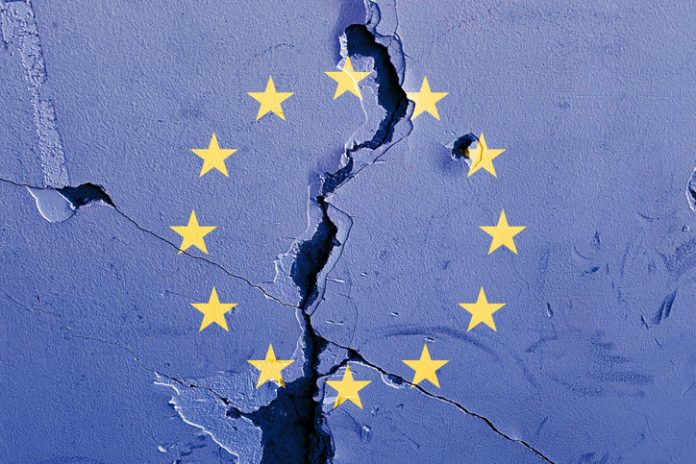“The far right made big gains in European elections,” reads the Associated Press headline on last week’s European Parliament elections. Lest you wonder why you should dread gains by the “far right,” the lead sentence of the article notes that the EU has “roots in the defeat of Nazi Germany and fascist Italy.”
For many readers, that juxtaposition is a reminder of the sharp rise in Nazi party percentages in Weimar Republic elections from 3% in 1928 to 18% in 1930, 33% and 37% in 1932, and 43% in 1933.
So is fascist dictatorship on the rise in Europe once again? No, and for multiple reasons.
First, European voters usually don’t take European Parliament elections seriously. The parliament can only amend or veto legislation passed by the non-elected European Commission and thus is mostly a talking shop. Turnout in EU elections has usually been well below that in national elections, and in many countries, voters typically cast protest votes in the knowledge that the winners will have only limited ability to set policy.
Second, the gains for the supposed “far-right” parties can easily be overstated. The Identity and Democracy Party increased from 49 seats to 62, and the nonaligned, not all of which is classed as “far right,” increased from 62 to 102. That sounds like a big shift, but “far-right” parties still hold only a small minority of the parliament’s 720 seats.
Third, and most importantly, the “far-right” parties don’t stand for anything like Hitler’s Nazis or Mussolini’s fascists. Even the Brothers of Italy party, members of which have praised Mussolini, is now solidly committed to constitutional democracy. Its leader, Giorgia Meloni, has been Italy’s prime minister since Oct. 2022, and it’s no more totalitarian than Italy’s center-left Democrats, which has historical roots in the Communist Party.
The losers in the EU elections are the Green, pro-EU, Left and Socialist parties. European and American journalists, imbibing the assumptions of vulgar Marxism or American New Dealers, have long assumed voters use their votes to grab others’ money and that their natural response to discontent is to seek economic redistribution.
But in post-welfare-state Europe, redistribution has gone about as far as it can go — or at least not many voters seem to want it to go further. Protest voters are unhappy about other aspects of the status quo. One reason, writes The New York Times’ David Leonhardt, is “because mainstream parties have dismissed public opinion on a major problem: the enormous rise of immigration.”
Or, as maverick conservative Andrew Sullivan put it, over the last decade, “in response to a volatile public mood, Western elites actually intensified their policy of importing millions of people from the developing world to replace their insufficiently diverse and declining domestic populations.”
As a result, 19% of Germany’s population is foreign-born, as is 15% of Spain’s and 13% of France’s, with many offspring of previous immigrants living in suburban high-rise ghettoes.
Academics and journalists, puzzled that modest-income voters don’t demand economic redistribution, tend to ascribe unease about immigration to racism or “status anxiety.” Allegedly bigoted voters just don’t like dark-skinned people or fear losing their “white privilege.”
But there’s a better explanation: Too many of the immigrants there are committing violent crimes or are violently trying to impose what Europeans regard as their oppressive religious restrictions on native European young women and gay men. Or massacre journalists who run cartoons of the prophet.
Similar increases in immigration from culturally hostile backgrounds help explain why Britain’s Conservatives are about to be swept from power after 14 years and why, despite low unemployment, President Joe Biden is trailing in the polls.
You don’t have to be racist or anxious about your status to be upset if you face an increased risk of being violently attacked or killed. You don’t have to be unaware that a country with a declining population needs more young workers to oppose governments that welcome hundreds of thousands of immigrants hostile to your culture and uninterested in actually working.
The gains for “far-right” parties may not change EU policies much, but they’re likely to affect politically responsible national leaders. France’s President Emmanuel Macron has called a snap two-round election.
French conservative party leader Eric Ciotti has announced an alliance with the hitherto boycotted “far-right” National Rally of Marine Le Pen and 28-year-old Jordan Bardella. With all three parties in Germany’s governing coalition running behind the verboten Alternative for Germany party, a snap election may be in order there as well.
European elites who opened borders and dismissed those worried about the consequences as racist have suffered a stinging rebuke. Maybe American elites who have done the same will also suffer electorally.
Michael Barone is a senior political analyst for the Washington Examiner, resident fellow at the American Enterprise Institute and longtime co-author of The Almanac of American Politics. His new book, “Mental Maps of the Founders: How Geographic Imagination Guided America’s Revolutionary Leaders,” is now available.
COPYRIGHT 2024 CREATORS.COM
For more great content from Rights, Justice & Culture News.
For more from The Heartland Institute.






